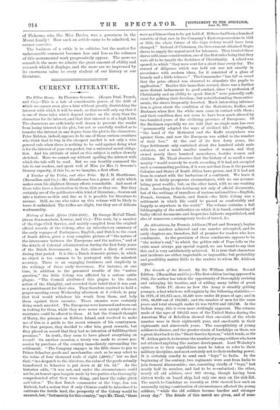History of South Africa (1486 - 1691). By George McCall Theal. (Swan
Sonnenschein, Lowrey, and Co.)—This work, by a member of the Cape Civil Service, and mainly compiled from the original official records of the Colony, after an introductory summary of the early voyages of Portuguese, English, and Dutch to the coast of South Africa, gives a very complete picture of "the nature of the intercourse between the Europeans and the natives," and of the details of Colonial administration during the first forty years of the Dutch Government ; in fact, almost a diary of events during that period. It is like a Dutch domestic picture, in which no object is too common to be portrayed with the minutest accuracy. There is an engaging frankness and simplicity in the writings of these early Governors. For instance, at one time, in addition to the perennial trouble of the "native question," the little Colony was afflicted by a serious cattle plague. "The Council attributed this plague to the direct action of the Almighty, and recorded their belief that it was sent as a punishment for their sins. They therefore resolved to hold a prayer-meeting every Wednesday afternoon at 4 o'clock, to pray that God would withdraw his wrath from them, and help them against their enemies. Those enemies were certainly doing much mischief. The Europeans were harassed and worn out in looking for them, while they were never seen except where no resistance could be offered to them. At last the Council thought of Harry, the prisoner on Robben Island, and resolved to make use of him as a guide to the secret retreats of his countrymen. For that purpose, they decided to offer him great rewards, but they placed on record that they had no intention of fulfilling their promises." In truth, they seem to have placed everything on record! On another occasion, a treaty was made to secure pos- session by purchase of the country immediately surrounding the settlement. "The Company engages in the fifth clause to pay to Prince Schacher goods and merchandise such as he may select to the value of four thousand reals of eight (.2800) ;" but we find that, "in a despatch to the directors, the value of the goods actually transferred to Schacher is put down at £2 16s. 5d." As the historian adds, "it was not, and under the circumstances could not be, an honest open bargain made by two parties who thoroughly comprehended what they were doing, and know the value given and taken." The first Dutch commander at the Cape, Jan van Riebeck, had a notion that if only Chinese could be introduced to cultivate the fertile land, the prosperity of the Colony would be ensured; but, "fortunately for this country," says Mr. Theal, "there
were no Chinese then to be got hold of. If there had been a hundred convicts of that race in the Company's Eastern possessions in 1653 or 1654, the whole future of the Cape Colony would have been changed." Instead of Chinamen, the Government obtained Negro slaves to supply the urgent need for labourers. They treated these slaves with some consideration, one of the first rules being that they were all to be taught the doctrines of Christianity. A school was opened, to which "they were sent for a short time every day. The reward of diligence which was held out was not exactly in accordance with modern ideas, for it consisted of a glass of brandy and a little tobacco." The Commander "has left on record that the prize offered was observed to stimulate the pupils to application." Besides this immediate reward, there was a further more distant inducement to good conduct, since "a profession of Christianity and an ability to speak Dutch" were generally suffi- cient for gaining their freedom ; but notwithstanding these entice meats, the slaves frequently deserted. Much interesting informa- tion is given about the condition of the Hottentots, Kaffirs, and Bushmen when first the white man came in contact with them ; and their condition does not seem to have been much altered by two hundred years of the civilising presence of Europeans. Of the Bushmen especially we are told that no single man has ever "permanently adopted the ways of civilised life." Originally, "the hand of the Hottentot and the Kaffir everywhere was against them, and now the European was added to the number of their foes." At the end of its first forty years, the Cape Settlement only contained about five hundred adult male colonists, and a much smaller number of women, and they owned nearly three hundred men-slaves, besides women and children. Mr. Theal observes that the history of so small a com- munity "would scarcely be worth recording if it had not occupied such a commanding position, if it were not that from it the present Colonies and States of South Africa have grown, and if it had not been in contact with the barbarism of a continent. We leave it in 1691 in fairly prosperous circumstances, with no one accumu- lating great wealth ; but, on the other hand, with no one wanting food. According to the testimony not only of official documents, but of the writings of travellers of various nationalities—English, French, German, Danish, and Dutch—the little Colony was a settlement in which life could be passed as comfortably and happily as anywhere in the world." The volume contains a full bibliography of the authorities on which it is based, consisting of bulky official documents and despatches hitherto unpublished, and also of numerous contemporary books of travel, &c.


















































 Previous page
Previous page